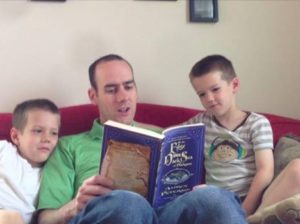Can We Read Just For Fun?
 Is reading to escape OK? Is it all right to look for a reading experience that “won’t change you” but is enjoyable—in other words, to read just for fun? So asked a commenter on another post recently. In that particular article, our guest blogger said, “Reading books is a waste of time if you don’t let them change you.”
Is reading to escape OK? Is it all right to look for a reading experience that “won’t change you” but is enjoyable—in other words, to read just for fun? So asked a commenter on another post recently. In that particular article, our guest blogger said, “Reading books is a waste of time if you don’t let them change you.”
I don’t think we need to couch this discussion in a bunch of spiritual gobbledygook. Beyond the realm of Christendom, as we discussed here at Spec Faith some years ago, psychologists have done brain-imaging studies and have written books and articles to demonstrate that the emotive experience of reading may actually effect readers AS IF THEY THEMSELVES HAVE PARTICIPATED in the story and endured the events their protagonist did.
The brain, it seems, does not make much of a distinction between reading about an experience and encountering it in real life; in each case, the same neurological regions are stimulated. Keith Oatley, an emeritus professor of cognitive psychology at the University of Toronto (and a published novelist), has proposed that reading produces a vivid simulation of reality, one that “runs on minds of readers just as computer simulations run on computers.” Fiction — with its redolent details, imaginative metaphors and attentive descriptions of people and their actions — offers an especially rich replica. (Anne Murphy Paul as reported in Psychology Today, “The Imagined And The Real.”
The point is simple: whether we intend to merely read to have fun, and we have no interest in letting the story change us, it still does exactly that.
Reading affects us. It can change us.
We “know” about things which the characters in the books we read, know. We “do” things the characters in the books we read, do. And above all, we feel things that the characters in the books we read, feel.
Of course, some books intend to prompt thought or reflection. Some introduce a controversy and guide readers by the choices the characters make and the decisions they come to, so that readers begin to see the controversy in a specific way. Still others preach. They are clear and directive and offer a choice for the reader to make, as an appeal from the author.
I don’t care, someone might say. I ignore all that and just read fun books, the ones that are “fluff,” that don’t deal with serious topics.
Sorry, but even those books affect us. There’s the way the story impacts our brains, as those psychological studies show, but there’s also the way that those books reinforce our choice to spend time reading them. If we think it’s OK to put our brain on hold and to engage in “harmless entertainment,” that in itself is a value, and the more we read and enjoy frivolous books, the more we are strengthening and giving nurture to that value.
We’re essentially finding a reward for the value we hold. That may not seem like a change, but it is an effect.
Then, too, there is the worldview of the author or the character who shows by his work, by his use of time, by his choice of entertainment, by his friends, by his lifestyle, what is important to him and what rules he’s living his life by.
 Of course reading stories, does not mean we automatically accept for ourselves the worldview of the main character. But it’s hard to ignore the fact that we become like those we hang with. So the characters we respect, admire, cheer for, do have an influence on us, if for no other reason than that we are spending so much time with them.
Of course reading stories, does not mean we automatically accept for ourselves the worldview of the main character. But it’s hard to ignore the fact that we become like those we hang with. So the characters we respect, admire, cheer for, do have an influence on us, if for no other reason than that we are spending so much time with them.
We can counter the effect by thinking about their choices and by intentionally choosing to do what we think is right, not whatever the character might have chosen. But we are fooling ourselves, I think, if we say that reading for fun and entertainment has no affect on us.
As I see it, the person most affected by reading is the person who doesn’t think reading affects him. Clearly he doesn’t have to consciously evaluate the book to be effected.
And for the record: I do think reading should be fun. It should be an entertaining experience, one we look forward to, one we want to introduce others to. But we should also have our eyes wide open. Reading, and reading fiction in particular, influences us, whether we’re consciously aware of it or not.






































Obligatory joke:
Puritanism: the fear that someone, somewhere is having fun.
That IS funny, notleia.
Yeah, in many cases. But Bunyan was a puritan, and I’m convinced he had a lot of fun writing Pilgrim’s Progress.
I had a fair bit of thoughtful fun reading it.
“We may be Pilgrims Passing Through this world, but let’s not be Grim Pills passing by.” (Arthur D Bardswell.)
But he’s a British Puritan. The most fun-hating ones came to America.